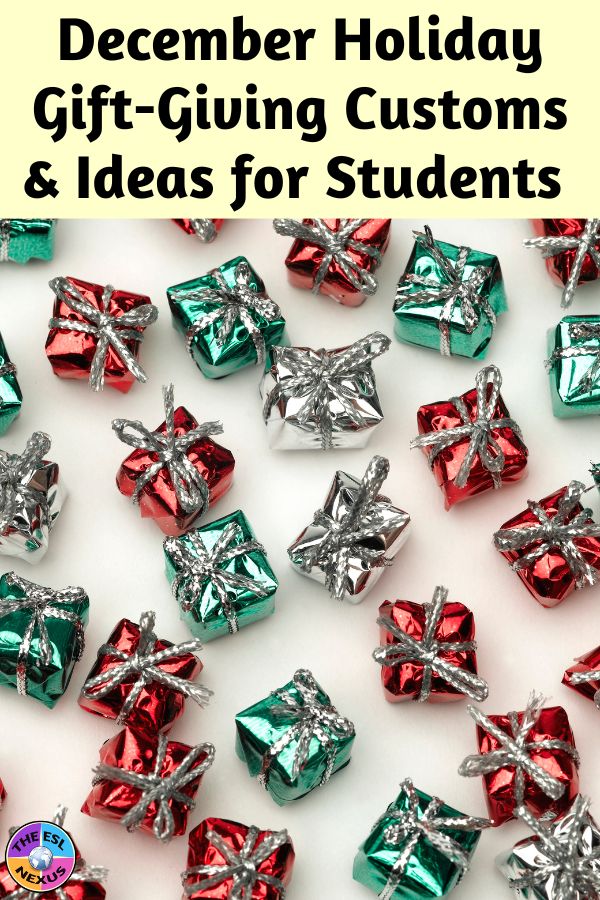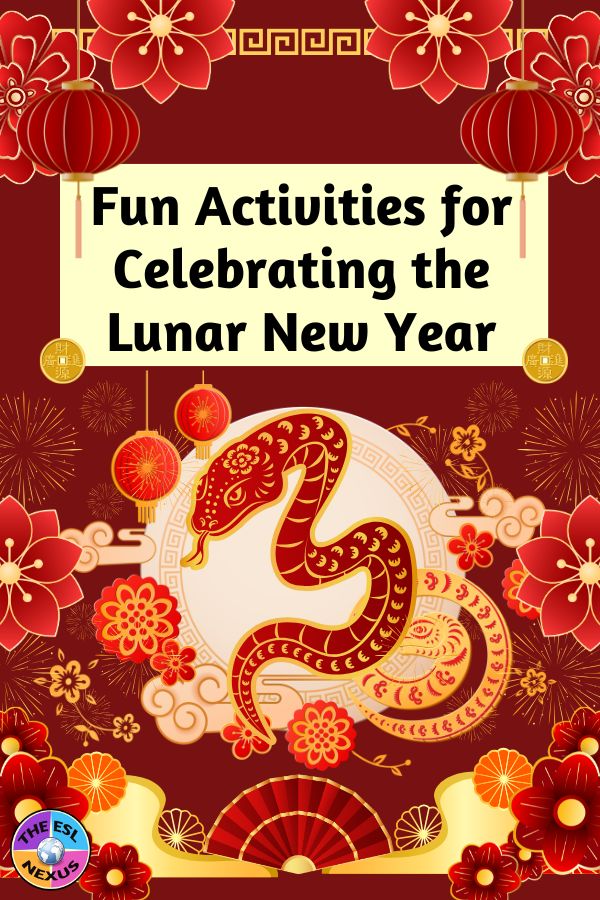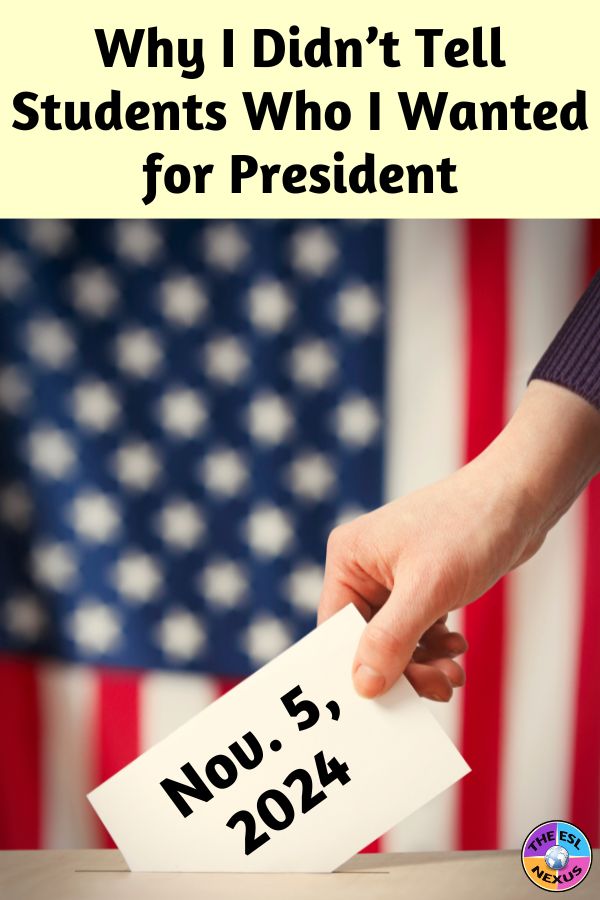Understanding the gift-giving customs of your English Language Learners’ home countries is important because it will prevent you from making any cultural faux pas. Every year before the December vacation at the end of the year, I gave a small present to my students. But it wasn’t always easy to find something elementary and middle school students would all like and which was inexpensive as well.
In this blog post, I’d like to share some information about giving students culturally appropriate gifts during this holiday period. Ideas for small, inexpensive gifts are suggested and 1-2 facts about when gifts are given are also included for countries that many Multilingual Learners of English have come from since 2010.

Why Understanding Gift-Giving Customs is Important
Did you know that if you give a clock as a gift to someone in China, it means their time is running out and you expect them to die soon? I didn’t until a Chinese friend gave me a small decorative clock when I was teaching in Nanjing. She must have known it’d be all right to give it to me, even as she explained why it wasn’t okay to give a clock to a Chinese person.
And do you know in which countries it’s not good form to open presents in front of the person giving it to you? That’s the case in many Asian cultures and in some South American countries as well.
What works in one culture might not be okay in another. When you know the expectations about giving gifts, it’s easier to give something appropriate and it shows you respect your students’ cultures.
Gift-Giving Customs by Country
The countries listed below in alphabetical order are the ones the most immigrants to the U.S. have come from in the past 14 years, according to the Migration Policy Institute. For each country, first 1-2 facts about gift-giving are presented and then, some gift ideas for students aged 6 – 15 are suggested.
Afghanistan
Common Customs: As a Muslim-majority country, December holidays are not traditionally celebrated. People give gifts during Eid al-Fitr instead.
Gift Ideas: Non-religious, practical gifts such as notebooks or pens.
Brazil
Common Customs: Christmas Eve is the important day to observe the holiday but gifts are given then and also on Christmas Day.
Gift Ideas: Soccer-themed items, puzzles, or festive stationery.
China
Common Customs: Christmas was not traditionally celebrated in China but now it is commercialized and observed in cities.
Gift Ideas: Avoid giving clocks or anything in white, which symbolize bad luck and death. Nice pens, small toys, and apples (because the word apple sounds like the word for peace).
Colombia
Common Customs: Families often exchange gifts on Christmas Eve.
Gift Ideas: Notebooks, pens, coloring supplies, or small toys.
Cuba
Common Customs: Christmas is celebrated but economic difficulties often limit gift exchanges.
Gift Ideas: Small, practical gifts like pencils, erasers, or art supplies.
Dominican Republic
Common Customs: People give and receive gifts on Three Kings’ Day (Epiphany), not Christmas Eve or Christmas Day.
Gift Ideas: Inexpensive gifts such as candy, small toys, or coloring books.
Guatemala
Common Customs: Families eat a big holiday meal and exchange gifts on Christmas Eve.
Gift Ideas: Candy, crayons, or small games.
Honduras
Common Customs: Families eat a big holiday meal and exchange gifts on Christmas Eve and some families also give gifts on Three Kings Day.
Gift Ideas: Practical gifts like school supplies or festive treats.
India
Common Customs: The Hindu festival of Diwali is more associated with gifts but Indians who are Christian exchange gifts on Christmas Day.
Gift Ideas: Choose non-religious, practical gifts like books or stationery.
Mexico
Common Customs: Giving gifts during Las Posadas is common and gifts are also given on Christmas Day and Three Kings’ Day (Epiphany).
Gift Ideas: Small gifts like candy or crafts.
Myanmar
Common Customs: As a Buddhist-majority country with a sizable Muslim minority, December holidays are not typically observed.
Gift Ideas: Simple gifts like puzzles or art supplies.
Nepal
Common Customs: Although less than 2% of the population is Christian, Christmas is a national, not religious, holiday in the country. People exchange gifts on both Christmas Eve and Christmas Day.
Gift Ideas: Practical gifts like pens or notebooks that don’t have religious connotations.
Nigeria
Common Customs: People attend church services, have big family meals, and exchange gifts on Christmas Eve.
Gift Ideas: Simple, practical items like notebooks, candy, or storybooks.
Philippines
Common Customs: Christmas is a major holiday and celebrations begin in September; Secret Santa gift exchanges are popular. Gifts are mostly exchanged by families on Christmas Eve but children may receive gifts from godparents on Christmas Day.
Gift Ideas: Festive gifts like candy, small toys, or classroom items.
Ukraine
Common Customs: The country historically followed the Orthodox Christian calendar so Christmas was celebrated on January 7 but since 2017, the holiday has been observed on December 25. Children typically receive gifts on December 6, St. Nicholas Day.
Gift Ideas: New Year-themed items, candy, or small toys.
Venezuela
Common Customs: Families get together for a big meal on Christmas Eve. Gifts are not delivered by Santa Claus but by Baby Jesus instead and are opened on Christmas Eve.
Gift Ideas: Simple gifts like small games, candy, or books.
Final Thoughts
When you know your students’ gift-giving customs, your December holiday gifts will be more meaningful. You may not be able to give candy or other food as a gift but whatever you decide to give, I’m sure your students will appreciate it and thank you.
If you are looking for a different kind of holiday gift, one thing you can do is get something on behalf of your entire class. My blog post about gifts that support various charities and help students learn about the world has some recommendations for non-profit organizations that I’ve used.
You might also like to decorate your classroom with posters that say Merry Christmas or Happy Hanukkah in a multitude of languages. You can purchase them HERE.
* Source of Migration Policy Institute info.




